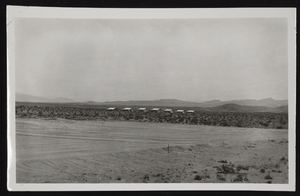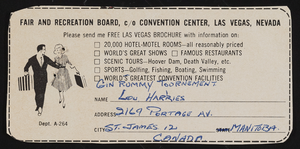Search the Special Collections and Archives Portal
Search Results
James Ryan oral history interview
Identifier
Abstract
Oral history interview with James "Sailor" Ryan conducted by Perry Kaufman in 1975 for the Ralph Roske Oral History Project on Early Las Vegas. Ryan discusses moving to Nevada from Montana in 1935. Ryan describes his career as a construction laborer for the Hoover Dam (Boulder Dam) as well as later positions in construction. Ryan also details his involvement in politics and his position in the Nevada Assembly. Lastly, Ryan discusses gambling and the growth of Las Vegas, Nevada.
Archival Collection
Vernon G. Stockall oral history interview
Identifier
Abstract
Oral history interview with Vernon G. Stockall conducted by Aurora Wright on March 07, 1981 for the Ralph Roske Oral History Project on Early Las Vegas. In this interview, Stockall discusses arriving in Boulder City, Nevada in 1935 and describes how the Great Depression caused people to migrate westward. He then recalls working as a pipe fitter at the Hoover Dam (Boulder Dam) and explains the type of work that he did. Lastly, Stockall discusses the growth of Las Vegas, Nevada as the population increased.
Archival Collection
Miriam Belmont oral history interview
Identifier
Abstract
Oral history interview with Miriam Belmont conducted by Laurie Brower on March 08, 1975 for the Ralph Roske Oral History Project on Early Las Vegas. During the interview Belmont discusses her move to Las Vegas, Nevada, various occupations, education, addresses, church involvement, Hoover Dam, famous people, atomic testing, Old Ranch Country Club in Southern California, and the ways in which Las Vegas had changed since she first arrived.
Archival Collection
Helen Cecil oral history interview
Identifier
Abstract
Oral history interview with Helen Cecil conducted by Susan Vogel on March 16, 1978 for the Ralph Roske Oral History Project on Early Las Vegas. Helen speaks about family life, education, employment and the growth and development of Las Vegas, Nevada. Helen talks about attending and working at Las Vegas High School. During the interview she also mentions the Boulder (Hoover) Dam, the Stewart Ranch, and the Westside.
Archival Collection
John P. Watkins oral history interview
Identifier
Abstract
Oral history interview with John P. Watkins conducted by Brian Watkins on March 04, 1979 for the Ralph Roske Oral History Project on Early Las Vegas. In this interview, Watkins discusses his personal history and education in medicine. He then describes being one of the first urologists in Las Vegas, Nevada and recalls his experiences at various hospitals throughout the city. Later, Watkins discusses the first malpractice insurance available and why such insurance was important for private physicians. Lastly, Watkins describes the American Medical Association (AMA), construction of Hoover Dam (Boulder Dam), and the development of casinos on the Las Vegas Strip.
Archival Collection

Photograph of housing, Boulder City (Nev.), approximately 1931-1936
Date
Archival Collection
Description
Image
Juanita Kilburg oral history interview
Identifier
Abstract
Oral history interview with Juanita Kilburg conducted by Vicente Camacho on March 07, 1981 for the Ralph Roske Oral History Project on Early Las Vegas. Kilburg discusses the Boulder (Hoover) Dam, McCarran International Airport, Nellis Air Force Base, living in Las Vegas, Nevada during the Great Depression, and casinos. The interview concludes with a discussion on her work with the American Legion service organization.
Archival Collection
Lillian and Lloyd Morrison oral history interview
Identifier
Abstract
Oral history interview with Lillian and Lloyd Morrison conducted by Don Morrison on October 20, 1991 for the UNLV Libraries Oral History Collection. The Morrison's talk about the loss of their Iowa farm in the Great Depression and Lloyd's decision to set out for Nevada to seek work at the Hoover dam construction site. He speaks at length about finding work, working on the dam, and an injury suffered in a fall that left him temporarily in a wheelchair. Lillian recalls arriving in Boulder City, Nevada some three years after Lloyd, of various homes the couple and their young son lived in, taking in boarders for extra money, and the growth and contraction of the town's population.
Archival Collection
Elton Garrett oral history interviews
Identifier
Abstract
Oral history interviews with Elton Garrett conducted by Dennis McBride on November 10 and 11, 1986 for the Boulder City Library Oral History Project. In these interviews, Garrett talks about hitchhiking into Nevada in 1928, the beginning of his journalism career in 1929, and the development and construction of the Hoover Dam and Boulder City. He relates anecdotes about events and people during this early period and talks about the choice of The Six Companies, Incorporated to build the dam. He continues, talking about the impact of prohibition, bootlegging, and illegal gambling before 1931. Later he talks about his work as an educator in Boulder City, and the decision by the city to work toward self-government and incorporation.
Archival Collection

